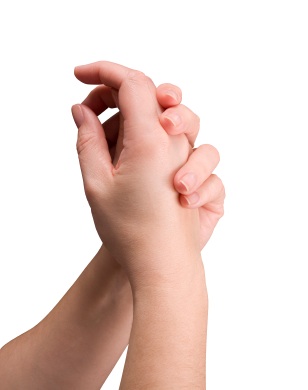Arthritis is a painful joint disorder caused by inflammation. The actual word arthritis is derived from the Greek meaning “inflamed joint.” When one or more joints become inflamed, arthritis is present. It is important to understand that arthritis is not a single disease; there are over 100 variations of arthritis that range in severity and cause. Arthritis is the most common disability of people over the age of 55. The most common form of arthritis is called osteoarthritis, which is caused by wear and tear of cartilage of large joints such as the knees, hips, and spine. Another common but painful form of arthritis is rheumatoid arthritis, which is caused by an overactive immune system. Other types of arthritis include gout, septic arthritis, lupus, and psoriatic arthritis.

Arthritis can be debilitating and interfere with the quality of life. By limiting daily activities, causing persistent pain, and often having a deformed appearance, arthritis can lead to depression and general unhealthy living. Many people feel that there is no real treatment for their symptoms, but consulting a physician can provide many useful medications, supplements, and procedures to reduce the severity of arthritis symptoms.
Causes
There are many different causes for the varying types of arthritis. Many kinds of arthritis are hereditary, caused by an injury, weight related, or occur for unknown reasons. Infection and certain illnesses can cause septic arthritis. Injuries caused by sports, occupational hazards, or a previous injury can cause or further aggravate arthritis symptoms. One of the most common causes of arthritis is weight. Excess weight can cause added pressure to the joints. Age is also a factor in arthritis. As the body ages, cartilage becomes more brittle and the body becomes less able to repair damage to bones and cartilage.
Symptoms
Symptoms of arthritis include pain, impaired function of the joints, inflammation, swelling, and joint stiffness. The different forms of arthritis can have varying symptoms that do not always directly involve the joints. Some of these non-joint related symptoms include fever, fatigue, swelling of the lymph nodes, and a general feeling of being unwell.
Diagnosis
If you suspect you have arthritis, meet with your doctor so he or she can examine the joint and check for inflammation or deformities. X-rays, urine tests, and some blood tests may be done to determine the severity and type of arthritis. Typically, just a general physician can adequately diagnose arthritis, but sometimes a specialist, or rheumatologist needs to be consulted. Rheumatologists are better able to diagnosis more difficult types of arthritis and prescribe treatments that help to combat the deterioration of arthritis on the body.
Prevention
To many it seems as though arthritis is inevitable. Going to a doctor at the first sign of arthritis symptoms can help to prevent the arthritis from progressing to a crippling state. Doctors can prescribe supplements or medications that can help reduce inflammation, repair damage to the cartilage, and slow the progression of arthritis. Those who are overweight can diet to lose some of the weight. Studies have shown that the increase weight adds extra strain on the joints, actually causing arthritis to progress further and increase damage to the joints. Some exercises can condition and strengthen the muscles surrounding the joints, helping to slow degeneration due to arthritis.
Arthritis? Get Remedies Fast!
Medications
Medications used to treat arthritis are plentiful and range from over the counter to prescriptions. Many companies produce creams that can help treat arthritis pain in mild cases. These creams can be purchased at the grocery store, health food store, or pharmacy. Pain relievers such as aspirin, Aleve, and Tylenol help to treat pain and inflammation associated with arthritis. Again, these are used to treat mild cases and do not always work for more severe pain. Prescription medication such as Enbrel and Remicade are used to treat more severe cases of arthritis. These medications are called biological response modifiers and they work to prevent the progressive destruction of the joints and reduce inflammation.
Cortisone Injections
Cortisone injections reduce inflammation caused by arthritis. While cortisone injections are not a pain reliever, they can provide relieve from inflammation for several months. Advantages of cortisone injections are the rapid effects of the medication and ability to relieve localized inflammation in the joints.
Those with infections or immune diseases should not take cortisone injections as they may worsen the infection or suppress the immune system. Cortisone injections also should be used cautiously in individuals with diabetes as cortisone has been shone to elevate blood sugar.
Herbal and Home Remedies
There are many natural ways to treat arthritis pain and inflammation at home. While there is no cure for arthritis, many remedies and supplements have been proven effective in the treating the symptoms of arthritis.
Epsom Salts
A popular treatment to relieve pain and swelling due to arthritis is soaking in a tub of hot water and Epsom salts. The warmth of the water in the bath increases circulation and helps to reduce swelling while the Epsom salts work to soothe the muscles around the joints. Mix 2 cups of Epsom salts into the bathwater and soak for 20 to 30 minutes. Epsom salts are very safe so you can use them in a bath daily or as often as you desire.
Alfalfa
Alfalfa is a common folk remedy used to treat arthritis in southern Appalachia. Many people make alfalfa teas by placing 1 ounce of alfalfa in a 1 quart pot filled with water. Boil for 30 minutes and drink the tea throughout the day for 2 to 3 weeks. The alfalfa works with the body to help ease arthritis pain associated with conditions such as lupus and other autoimmune diseases.
Black Cohosh
In many Native American cultures, black cohosh is used in the treatment of arthritis. It is used to treat rheumatoid arthritis and contains many anti-inflammatory properties. Mix 1 cup of boiling water with a teaspoon of black cohosh root and boil together for 20 to 30 minutes. Divide the tea into two doses, drinking it once in the morning and once in the evening. Continue to drink the tea for two to three weeks.
Wintergreen
Another popular arthritis treatment used by Native Americans is wintergreen. In 1820, wintergreen was accepted as an official medicine for the treatment of arthritis. Wintergreen contains methyl-salicylate, which acts as a pain reliever. A good recipe for a wintergreen pain reliever is to place 1 or 2 teaspoons of dried wintergreen leaves in a cup of boiling water; cover the cup and allow to steep for 15 to 20 minutes. Strain the tea, making sure all the bits of wintergreen are removed, and drink 3 cups a day for best results.
Capsicum
Capsicum is the pain-relieving chemical found in red pepper and Cayenne pepper. There are many over the counter creams such as Capzasin-P that help to relieve arthritis pain. You can apply the cream directly to the joint up to 4 times a day.
Oregano
Oregano is a powerful antioxidant that possesses anti-inflammatory and antiviral properties. The antioxidants found in oregano help to reduce the cell damage caused by free radicals, which have been linked to arthritis deterioration. Adding more oregano, preferably fresh oregano, to your diet can help to reduce some of the pain and swelling caused by arthritis.
Vitamins and Supplements
Glucosamine and Chondroitin
Glucosamine is produced naturally in healthy joints; it stimulates the formation of cartilage that helps in repairing joints damaged by arthritis. Used in combination with chondroitin, the supplements stimulates cartilage repair, reduces joint inflammation, and is effective in relieving pain. 500 mg of a glucosamine and chhondroitin supplement, such as Osteo Bi-Flex, taken twice daily has been scientifically proven to reduce symptoms and prevent further arthritis damage in the knees. It may take as long as 6 to 8 weeks before there are signs of improvement when using a glucosamine and chondroitin supplement.
Vitamin E
Vitamin E possesses anti-inflammatory properties and helps to reduce pain. By protecting against muscle wasting, vitamin E also helps to slow the progression of arthritis. Studies have shown that taking 400 mg of vitamin E daily works to reduce many of the symptoms associated with arthritis. Foods such as almonds, tomatoes, peanut butter, and avocados have naturally high levels of vitamin E and can help boost levels in the body.
Methylsulphonylmethane (MSM)
MSM a natural source of sulfur, that is odorless and tasteless, that is found in all living things. Meats, diary products, fish, and certain vegetables all contain high levels of MSM. MSM helps to relieve arthritis pain and maintain joint health because sulfur is an essential in creating connective tissue. Studies indicate that taking 500 mg of MSM 4 times a day can reduce pain and help to combat the progression of arthritis.
Vitamin K
Those who are deficient in vitamin K are more susceptible to bone and cartilage degeneration. As you age, the body begins to lose its vitamin K resources. Supplementing the body with foods that have naturally high levels of vitamin K, such as avocados, green, leafy vegetables, yogurt, and broccoli can help to fight the severity and damage to the joints caused by arthritis.
Calcium
The average adult diet contains approximately 550 mg of calcium per day. The United States Department of Health recommends between 800 and 1,200 mg of calcium to be consumed daily. Calcium has been proven to strengthen bone and cartilage; consuming proper amounts can help to prevent deterioration. When taking calcium supplements, look for an easily absorbed form or calcium and try to divide the dose. Calcium is absorbed into the body better when taken over time rather than all at once.
Arthritis Surgery
 If all other treatments do not help relieve arthritis symptoms, surgery may be the best option. Joint surgery can finally relieve pain from those who suffer constantly from extreme pain that is not eased by less invasive measures. Benefits of surgery include improved mobility and joint use, repair of hurt joints, and replacement of damaged or missing cartilage.
If all other treatments do not help relieve arthritis symptoms, surgery may be the best option. Joint surgery can finally relieve pain from those who suffer constantly from extreme pain that is not eased by less invasive measures. Benefits of surgery include improved mobility and joint use, repair of hurt joints, and replacement of damaged or missing cartilage.
There are many different types of surgery that vary based on severity and kind of arthritis.
Osteotomy
This surgery corrects bone deformity by cutting and repositioning the bone. This is used for weight-bearing joints such as the knee. Those who are too young for total hip replacement often undergo osteotomy.
Resection
Resection is the removal of part or all of a bone; this is typically done in the foot, wrist, and elbow. This particular type of surgery improves joint function and relieves almost all pain.
Arthroplasty
Arthroplasty is a surgery that rebuilds the joints by resurfacing the ends of the bones where cartilage has deteriorated. This can be done by replacing the all or part of the joint..
Total joint replacement
This particular type of surgery removes the damaged bone or joint tissue and replaces it with plastic, ceramic, and metal parts. Total joint replacement surgery is quite common and has had excellent results. This surgery can help improve mobility in the knees, hips, shoulders, and elbows. Total joint replacement surgery helps those who were otherwise immobile live more active and healthy lives.

1 Comment
I have severe pain in my left thumb, caused by it being dislocated in college. What would you recommend for me to take to relieve the pain?